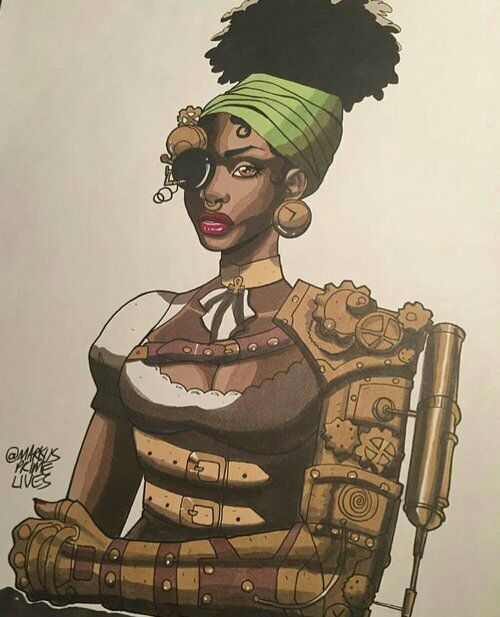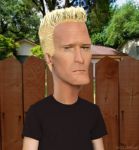Meet the Artist Using Superheroes to Highlight Racism

Tags: USA
Meet the Artist Using Superheroes to Highlight Racism published by Evanvinh
Writer Rating: 5.0000
Posted on 2016-04-03
Writer Description: Evanvinh
This writer has written 733 articles.
By Emma Bracy
We caught up with artist Markus Prime, a graphic illustrator who is using his talents to explore issues of race, class, and representation in his new book, “B.R.U.H.”
Graphics illustrator Markus Prime's B.R.U.H.: Black Renditions of Universal Heroes comes out today. In B.R.U.H., Prime reimagines some of pop culture's most beloved superheroes as black women which poses the question: what if heroes that we grew up were women of color? Would we love them as much? And if the answer is no, then why?
We sat down with the self-described nerd in anticipation of his new book to talk about his art, blackness, and his expert knowledge of all things cartoon.
Broadly: How did you create B.R.U.H and why now?
Markus Prime: I used to draw black versions of superheroes when I was in middle school and high school. I recently delved back into and it; I just felt like it was necessary, in a way. I can't give you a super deep reason, but I felt really compelled to put the project together after seeing the response—it really showed me the void, just the lack of representation. I thought about doing [a book] with just original characters, ultimately felt this was more important because I just wanted to put the question out there: What if some of the most popular cartoons and heroes that we grew up watching, what if they were women of color? How would that affect the industry, how would that affect us as a society now
In the intro to your book, you reference the Teenage Mutant Ninja Turtles' April O'Neil, asking if the franchise would've been less successful if April were black (whether her character was whitewashed is a point of contestation explored in this visual history of the comic). You go on to say that the subject matter would've changed dramatically if she had been black, adding depth and new directions. Can you talk about that?
Ninja Turtles is already one of the most popular cartoons of all time, so just imagine how many black girls probably would have wanted to become news reporters, or how many girls would've been like, "I want to be an actress!" because they saw a black woman featured in some of the most popular cartoons and movies in the country. Or, "I see a black woman in this comic book, now I want to draw comics." Simple things like that. Maybe she would have inspired confidence. "That's so cool, we can be in this kind of movie, we can be in action movies," etc.... Just how impactful that would've been? That little change? I really believe it could've changed the entire culture—it could've changed cartoons and comic books because there would've been people trying to follow suit. When something is the most popular, everybody's trying to follow suit or compete with it in some way. There probably would've been more women of color, men of color getting parts in movies! I believe very strongly that there's a web of things that would've happened if they would've kept April as a black woman in the cartoon and movies.

What have been some meaningful representations of female blackness in culture for you?
One of them is the show Steven Universe on Cartoon Network. I would highly recommend observing it. It's about a young boy born with special powers. His mother passed in a great war, so he's adopted by these three [anthropomorphized] stones; one of them is [the character] Garnet, [based on] the very powerful red stone. She's actually voiced by Estelle, the singer. She's very much supposed to be the embodiment of a black woman; she has an afro, a powerful physique, the way she's drawn—she's a black woman, period. This cartoon is written by a woman; I think it's very important that she is controlling the narrative. There are so many girls of color in the show's fan base; they're coming out to conventions, excited to dress up as [Garnet] and excited to be a part of this industry now because they have this representation. That's one of my main ones. To be honest, there's not a lot from which I can really draw, which is part of the problem.
You and Amandla Stenberg (known best for her role as Rue in the Hunger Games) are collaborating. What's the project?
That is still ongoing. It's been very fun, drawing for her comic Niobe: She is Life. Stranger Comics just released the second issue. Sebastian Jones and Amandla co-wrote the project; it was actually based off a graphic novel that Sebastian had written prior to meeting Amandla. Naobi was a character—she's basically just a badass warrior elf and the first one of color in this form to pretty much dominate a series.

I guess him and Amandla connected and she was interested in expanding that character, which is based off of her now. I met her in New York, she asked me to be a part of [the project], and I had to. How could I not be a part of that? Amandla is such an old soul. She's so wise and has so much to offer and I just think it's cool to watch her and delve into this character; it kind of goes back to perspective. Even though she was feminist of the year [with Rowan Blanchard], it doesn't mean she's just deep all the time. She is very much a nerd; she's into a lot of the same cartoons that a lot of us are into. She loves comics; she loves all these things. I think it's cool that she can be profound and still be into the fun of things like this. That's why I'm a part of [the project].

When was the first time you saw yourself represented in pop culture?
Oh that's easy; I would honestly say Pharrell's video "Frontin." That was, like, one of the first times I seen somebody who was cool with being a nerd. You could like anime, you could like skateboarding, you could be into the architecture in modern homes. You could be into so many things and still be a black person, you could still be a fly dude, you could still get the girl, if that makes sense. I can still be a businessman and come home and watch Dragon Ball Z?! "Frontin" was easily one of the defining moments where I was like, "Fuck this, anime is fly." That was really important to me because I was made fun of a lot as a child. First of all, to be a black nerd was not a thing. We were not embraced. All we had was Steve Urkle, and I was not even close to that. It was very important to me that that video came out.
Hypothetically, if you were to have kids what would you teach them about women?
You know what, it's one of those things where I'm still learning. Hopefully, I have a black woman in my life that can help me. If I have sons, I will definitely teach them to listen to women. To approach women as equals. "That's another person you're dealing with, not somebody who's beneath you." My art journey has been me unlearning a lot of things, a lot of the ways we as men have looked at women and talked to women. I hope I have plenty to teach to [my kids], but respect would be the main one. That's a journey within itself because there's so much that comes with respect that we are still learning even now in terms of sex, in terms of equality in the workplace, and especially in terms of respecting each other's knowledge.
Sources: https://broadly.vice.com/en_us/article/meet-the-artist-using-superheroes-to-highlight-racism
You have the right to stay anonymous in your comments, share at your own discretion.


